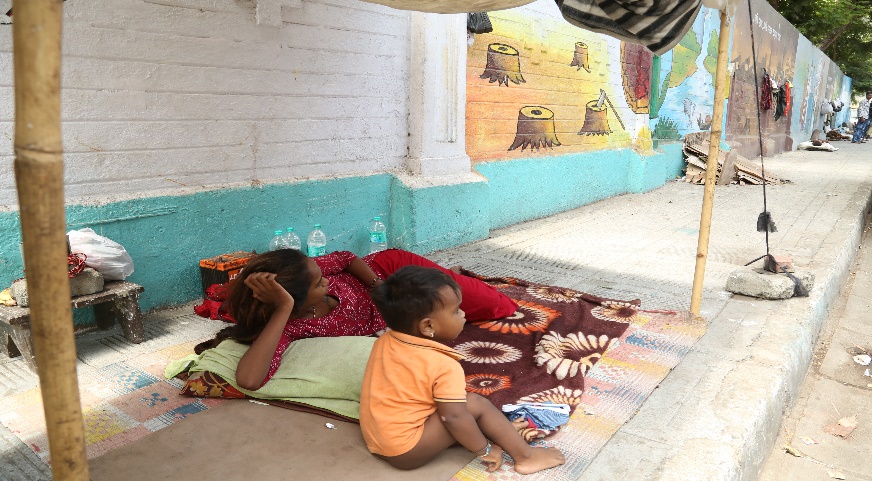Meet Kavita
It’s nearly midnight when Kavita stretches out her bamboo mat on a Mumbai roadside to catch a few hours of sleep. Kavita is in the same colourful salwar kameez she wore throughout the day and with no bathroom to wash up in and no door to lock, preparations for bed take just seconds. All that surrounds her, what she can call “home” is the small, enclosed space created by old sheets. Her house of cloth is one that can be constructed and deconstructed at any moment, depending on the whims of city officials or local residents. However, this unassuming spot is the only one she knows; she’s been there for decades along with thousands of other men, women and children who call the pavements home.
Sleep for Mumbai’s homeless doesn’t come easily. Although the relative quietness provides some relief, night brings its own worries. Kavita lives with her four brothers, three sisters, mother and father but rarely feels safe enough to fall into a deep slumber. She and her friend Sangeeta, who lives on the pavement nearby with her family, say they often take turns staying up through the night to ward off men with unscrupulous intentions.
This open-air routine is tirelessly familiar to her. Kavita was born on the streets 21 years ago. Her parents were married here and for 50 years, the family has bathed, cooked, cried, celebrated, worked and slept on a slice of footpath no bigger than a bathroom you’d find in a typical household in Europe. Without permanent walls, Kavita is forced to conduct her daily routine in full public view.
As the eldest girl, Kavita carries herself with the confidence and determination needed to take on a system that has left Mumbai’s working poor in a decades-long state of utter neglect. Torrential monsoon rains bring fever, illness and sometimes even unnecessary death. Kavita and her family do not have access to clean water and they must pay to use the toilet and to wash their clothes at public bathrooms, extra expenditure they can ill afford. Harassment from authorities and local residents puts their pavement homes under daily threat of being pushed out. Kavita owns few possessions: a small cooking stove, a few changes of clothing, a bucket to bathe in. In a life filled with waiting for government intervention, for respect from the city she calls home, for a day without struggle, Kavita is also in a constant state of readiness to being ‘moved on’ at any moment.
Kavita rises at dawn to head to a nearby market, where she sells used clothes that she collects from housewives residing in the nearby tenements. She deals in small amounts 10, 20 or 50 rupees just enough to feed her family members for the day, with little left over to meet her one aspiration: to move her family into the security of a small room, any space they could safely call home.
“I want to be something. I want to improve my life. I can’t live my entire life this way,” she says. Like most children of the streets, she left school to help support her family. Illiteracy, Kavita confesses, has been an obstacle to getting better work and wages. Her own lack of education has fuelled her crusade for the next generation of girls in her family, especially for her two nieces. “I’ll do anything … I’ll make garlands from flowers, any kind of domestic work, even if I get 20 rupees, I’ll save it up. But I’ll make their life better. Tomorrow, my nieces won’t say, “my mother’s sister left me illiterate”. Rather, “I was illiterate but I overcame this by the help of my mother’s sister.’”
Kavita and her family live their precarious existence surrounded by the abundant offerings of central Mumbai, one of the sprawling city’s busiest and most affluent neighbourhoods. The city’s main train station, Mumbai Central, loads off legions of new arrivals to the city from villages across the country. Kavita’s parents once disembarked from this station, never realising they would spend half a century just outside its doors, giving birth to their children there and watching them grow up out in the open. They quickly realised that the “city of dreams”- where Bollywood and India’s Wall Street converge, doesn’t roll out the red carpet for everyone
Kavita, and her family are some of the first beneficiaries of our ID program. They will be part of the first cohort to enrol and in time receive official documentation, which in turn will help them move on. The little time she has to herself she devotes to advising other women and families on how to receive schooling or find jobs in the area. What she really wants though, is respect “Being poor,” she says, “is not a crime,” and she wants the city to see its homeless residents as contributors who need help and who have dreams and aspirations like any other member of society. “We also want a house and want our children and grandchildren to do well,” she says. “I also want a better life.”
